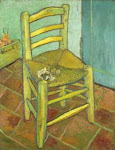Vincent's last letter to Theo was sent from Auvers-sur-Oise on 24 July 1890. (See a translation of the letter here.)
Piecing together the events of the last weeks of Vincent's life is difficult. His disjointed final letters to Theo reveal dispiritedness and anxiety about the future, and with good reason: when Vincent wrote his last letter, he believed Theo's position as manager of the Boulevard Montmartre branch of the Boussod & Valadon gallery was in jeopardy. Theo had asked for a raise (hence Vincent's reference to "those worthy gentlemen") and threatened to quit if he was not given one. Theo had the idea of opening his own gallery--an idea that Vincent disagreed with (and which fell apart when Theo's brother-in-law, Dries Bonger, withdrew financial support from the venture). The subtext of Vincent's July letters suggests he felt himself a burden on Theo, surely a factor in his decision to shoot himself on 27 July. However, there is no indication in this letter, nor in the draft version found in his pocket after he was wounded that he was contemplating suicide. He even asks for more paints as if planning to work as usual. Based on surviving evidence, his suicide does not appear to have been premeditated. That particular day, things may have proved to be too much.
Here is the irony. Vincent did not know--and never found out--that Theo settled matters with his bosses on 21 July. He decided to stay at the gallery and forfeit a raise. Theo wrote his wife Johanna that evening (she was in Amsterdam with her parents) to tell her the news, and he wrote his sister and mother 22 July to reassure them as well. But Theo's letter to Vincent from 22 July does not mention it. Instead Theo refers to an earlier, now-lost letter from Vincent, which evidently mentioned "domestic quarrels" between Theo and Johanna, and spends much of his letter trying to clarify matters. Why Theo did not tell Vincent about settling things with his job is genuinely mysterious. Did Theo underestimate Vincent's worry on the matter? Assume that Vincent would hear it from their mother or sister? Simply forget to mention it in focusing on the alleged "domestic quarrel"? (Theo's letters to Johanna reveal a similar puzzlement over Vincent's allegations.) Theo would not deliberately withhold the information to hurt Vincent--that much is clear from the concern expressed from Theo to Johanna about Vincent's health at this point, and from Theo's deep love for his brother in general.
Suppose Theo had told Vincent everything was fine at work and he had no need to worry. How differently would Vincent's last letter read? Worse to think about ... would it have *been* the last letter?
[For a recent analysis of the events leading up to Vincent's death, see the excellent compilation, "Brief Happiness: The Correspondence of Theo van Gogh and Jo Bonger" (Van Gogh Museum 1999) 42-44, and see too Theo and Johanna's letters to each other in the same volume. The Van Gogh Museum's new edition of the complete van Gogh correspondence, due to be released in late 2009, may shed further insight on events with new research.]
Subscribe to:
Post Comments (Atom)






1 comment:
Is there definite evidence that Vincent actually shot himself? The local people were aware of his time in the asylum.. They were concerned that he might be a problem for them or cause them problems. People talk. What if someone thought that they could be a 'hero' and were 'saving' their community by eliminating (shooting) Vincent in the field where no one could witness their deed? Has anyone studied that concept? It WAS the summer of 1890...
Post a Comment